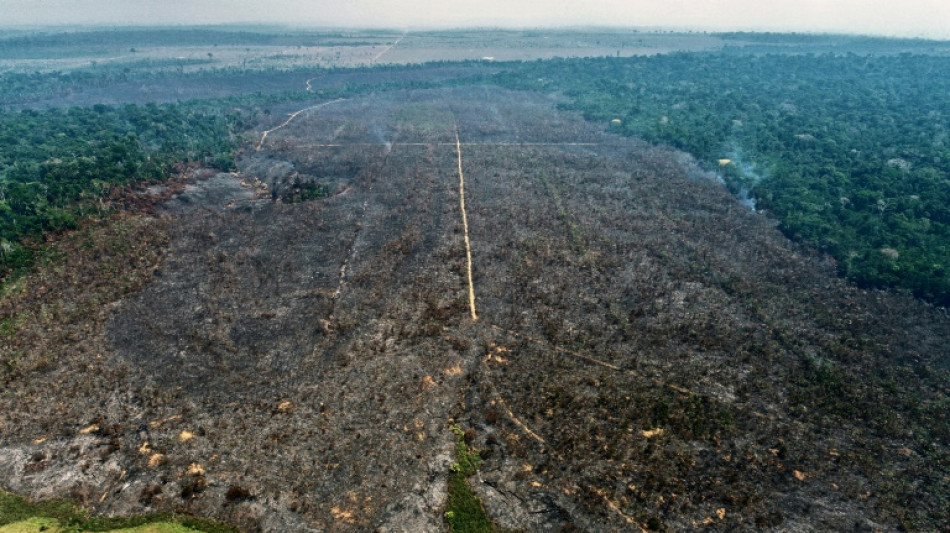It was supposed to be a good-news story out of the damaged Amazon rainforest: a project that replanted hundreds of thousands of trees in an illegally deforested nature reserve in Brazil.
Then it went up in flames, allegedly torched by land-grabbers trying to reclaim the territory for cattle pasture.
Launched in 2019 by environmental research group Rioterra, the reforestation project took 270 hectares (665 acres) of forest that had been razed by cattle ranching on a protected nature reserve in the northern state of Rondonia and replanted it with 360,000 trees.
The idea was ambitious, says Rioterra's project coordinator, Alexis Bastos: save a corner of the world's biggest rainforest, fighting climate change and creating green jobs along the way.
Then, just as the scarred brown land started returning to emerald-green forest -- its growing young trees absorbing an estimated 8,000 tonnes of carbon from the atmosphere in three years -- the whole thing burned to the ground.
Bastos remembers the sinking feeling he got when he saw the area turned to ashes.
"It was horrible," he told AFP.
"People have no idea how much work went into restoring that forest. It was a really important, large-scale project."
Investigators concluded the fire, which started on September 3, was arson, according to a forensic report by federal environmental agency ICMBio obtained by AFP.
"The likely motive was to obstruct the process of ecological restoration in the area," it said.
- Telltale sign -
Satellite images indicate the fire traveled in the opposite direction from the wind -- often a sign of arson, investigators say.
The lead prosecutor on the case, Pablo Hernandez Viscardi, said police have identified multiple suspects.
The project is located on the southwestern side of the 95,000-hectare Rio Preto-Jacunda State Nature Reserve.
It is so remote that Rioterra staff only got there on September 6, a day after satellite images alerted them to the destruction.
When they arrived, they found the access roads had been blocked by felled trees.
The project cost nearly $1 million, and directly employed more than 100 people, according to Rioterra.
Besides helping in the climate fight, it also aimed to provide a sustainable source of income to local residents by planting species such as acai palms, whose small purple berries have sparked an international "superfood" trend for their nutritional and antioxidant properties.
Bastos, 49, recalled how he and his team worked painstakingly on the project through Christmas and New Year's in 2020, the year they planted the trees, camping out on-site.
- Death threats -
But the project did not go down well with some in the region, home to a powerful ranching industry.
Investigators say the Rio Preto-Jacunda reserve is bordered by ranches with a record of environmental crimes, including repeated encroachments on the reserve.
Razing protected rainforest for pasture is an illegal but lucrative business in Brazil, the world's top beef exporter.
The crime often hits remote, hard-to-police nature reserves, overlapping with other organized criminal activities destroying the Amazon, including illegal logging and gold mining.
Satellite images show how the Rio Preto-Jacunda reserve's verdant jungle is bordered by razed brown land, which spills over into the supposedly protected area in several places on the southwestern side.
Bastos said Rioterra staff "constantly" received death threats over the project.
"One time the guys ambushed one of our collaborators and put a gun to his head. They said, 'Look, this is a message. But if you keep trying to recover this area, it won't be just a message next time.'"
Viscardi, the prosecutor, said Rondonia is struggling with a rash of environmental crimes by mafia that specialize in land-grabbing using hired guns and guerrilla tactics.
"Given the modus operandi, that's probably what's happening in the Rio Preto-Jacunda reserve," he told AFP.
Undeterred, Bastos vowed to start again from scratch.
"We can't let land-grabbers think this is normal, that they're more powerful than the state," he said.
"We as a society have to stop this."
F.Mahajan--BD
